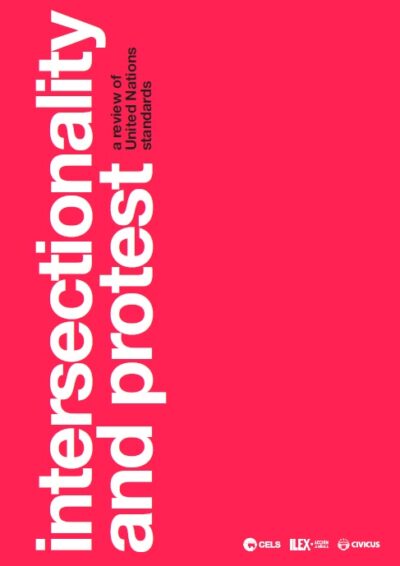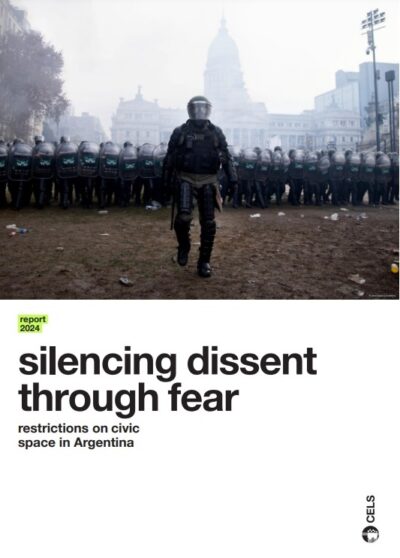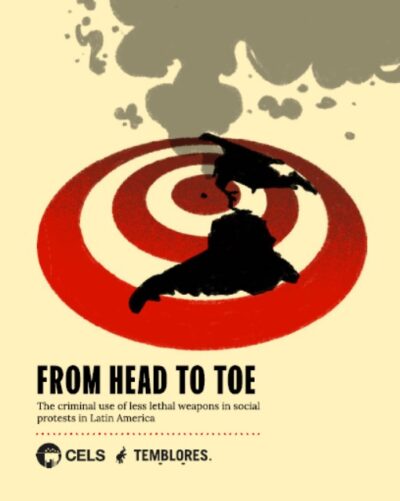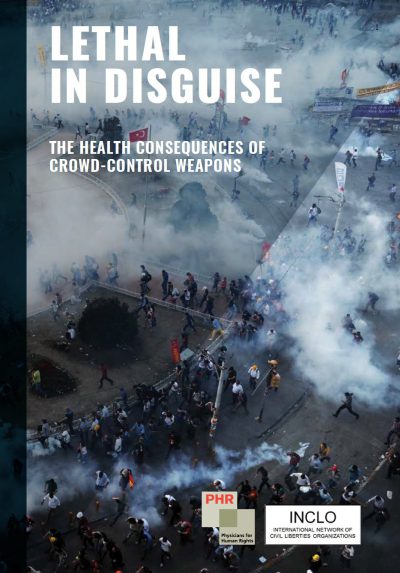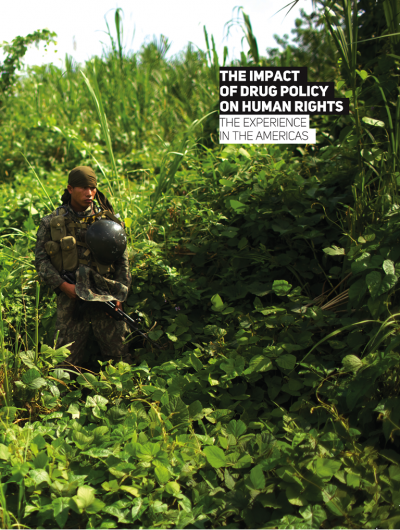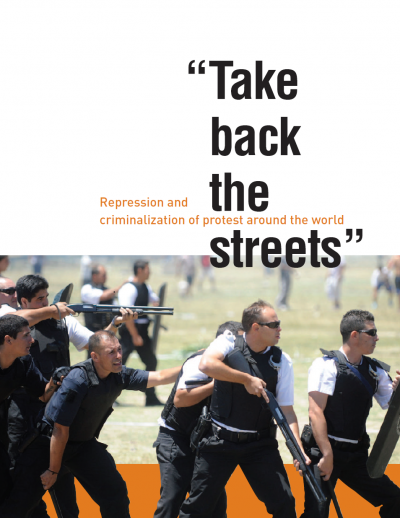Repression as policy: Violence, arbitrary detentions, and the use of dangerous weapons in Argentina
The mobilization outside Congress demanding a pension increase on March 12 was violently repressed in a large-scale operation involving five security forces. Security Minister Patricia Bullrich had warned in advance that there would be repression. Tear gas, rubber bullets, and arbitrary detentions marked a day in which the government justified its actions by invoking the narrative of an “attempted coup.”
UN: we denounced the restrictions on civic space and the unconstitutionality of the IMF loan at the human rights council
During the 58th session of the Human Rights Council, CELS participated in two interactive dialogues with Special Rapporteurs to present on the current situation in Argentina.
IACHR Hearing: State denies responsibility for December 2001 killings and repression
The Argentine State withdrew its previous acknowledgment of responsibility for the repression carried out in 2001, which it had accepted in 2023. Officials declined to answer questions regarding the State’s new assessment of the events that occurred in December 2001. The events of December 19 and 20, 2001, were an extreme manifestation of state violence following the unjustified declaration of a State of Siege.
Intersectionality and protest
Autor/a: CELS, ILEX, CIVICUS
16 pages
ver más
Silencing dissent through fear. Restrictions on civic space in Argentina
Autor/a: CELS
10 pages
ver más
From head to toe: the criminal use of less lethal weapons in social protests in Latin America
Autor/a: CELS & Temblores
51 pags.
ver más
100 Days of Javier Milei’s government: vindicates the dictatorship and attempts to militarize domestic security policies
Javier Milei’s government vindicates the criminal plan of the armed forces carried out during the 1970s. But it is not just an attempt to rewrite history and deny these crimes; it also aims to legitimize his policies in the present.
Repression at the Congress: we call on the IACHR to protect the right to protest
Together with human rights defender organizations, we asked that the Inter-American Commission on Human Rights (IACHR) take precautionary measures in favor of press workers, human rights defenders, and protesters. We expressed our deep concern about the recurrence of disproportionate security operations that result in people being detained and seriously injured.
On Milei’s “omnibus bill”
The Argentine government led by Javier Milei seeks to dismantle essential procedures and implement regressive measures affecting human rights and democracy. Within a span of three weeks, from Decree 70/23 to the proposed “Bases…” law, the Executive Branch introduced 1649 articles altering the entire social and political landscape, protection parameters, and state architecture. Congress bears the political responsibility to refrain from validating it.
IACHR: Request for a visit to Argentina to assess violations against indigenous peoples
Rights organizations and representatives of indigenous communities highlight an increase in violence and structural racism by the state, denial of access to territory, lack of prior consultation and the critical situation in the province of Jujuy.
Protests and escalation of state violence in the Argentine province of Jujuy
Mass mobilizations to protest for higher wages were further heightened by demonstrations against the constitutional reform proposed by the government of Jujuy. The government responded by quashing the demonstrations and criminalizing protesters, resulting in dozens of injured and arbitrary arrests. This new constitution passed in record time restricts the enjoyment of human rights and seeks to avoid social demonstration against the active expansion of mineral extractivism.
Urban drug trafficking, migrants, and the defense of activists: some of Cels’ topics for #fmdh23.
Between March 20 and 24, we will participate in the 3rd World Forum on Human Rights, organized by UNESCO, in Buenos Aires. As members of several committees, CELS is participating in more than a dozen activities for exchange and debate.
Magdalena massacre hearing at the IACHR: the State acknowledges responsibility for the 33 deaths
More than 17 years later, the Argentine State acknowledged before the Inter-American Commission on Human Rights its international responsibility for the incident and committed to put a series of measures in place to prevent such cruel deaths from ever happening again. CELS and the Colectivo de Investigación y Acción Jurídica (CIAJ) took part in the hearing as representatives of the victim’s families.
Criminalization of LGBTI+ people: petition before IACHR to guarantee rights
On October 28 we took part in the thematic hearing as members of the LGBTI+ Litigators of the Americas Network alongside other organizations from the region. We put in an urgent call for reform of Argentina’s drug law and repeal of the misdemeanor codes that allow the criminalization of sex trafficking in public spaces.
Indigenous peoples: the state fails to meet its commitments and backslides in response to racist pressure
Despite having the right to ownership and possession of their ancestral territories, this right is not enforced nor are there policies in place to guarantee that Indigenous people can live out their lives in keeping with their identity. The progress made in recent decades has not been sufficient. State response is often couched in rhetoric and stigmatizing stereotypes. The growing number of complaints is linked to this historic debt.
Colombia: Call for the End of State Violence and for the IACHR to Investigate on Acts of Repression
650 civil society organizations call for a thorough investigation of the repression of social protest and request an on-site visit by the IACHR and the creation of a group of experts.
Absolution for Luz Aimé Díaz
As the hearings begin in Luz Aimé’s trial, we at CELS join the campaign for her absolution. The case has been marked by discrimination based on her travesti identity wich lead to a change in charges based on an exagerated hypothesis that cannot be substantiated by facts. The deficiency of the justice system ends up putting innocent people in prison, leaves the victims of offenses without reparation while offenders remain unpunished.
Request for the Convening of a Special Session on the Escalating Situation of Police Violence and Repression of Protests in the United States
CELS endorses letter addressed to the UN in which family members of victims of racial police violence and human rights organizations worldwide ask for independent inquiries.
Chile: Final Report of The International Human Rights Observation Mission
The collaborative document provides an account of generalized human rights violations perpetrated by state agents between October 18 and December 31, 2019. It also highlights that the violence unfolded by security forces was exacerbated by the president’s suspension of the Constitution.
The Consequences of Less-Lethal Weapons in Chile
Since the beginning of the demonstrations in Chile, over 2800 protesters have been injured, among which 1180 by rubber bullets and pellets.
Chile: Preliminary report by an international human rights mission
The mission visited Santiago, Valparaíso and Temuco to meet with human rights and civil society organizations and other groups, as well as state institutions. The initial result is a report that provides a survey of human rights violations and recommendations for the Chilean state.
Intimidation of Brazilian human rights defenders engaging with the UN
During two side events at the United Nations, Jean Wyllys and Luciana Zaffalon were intimidated by Brazilian officials.
The impact of new authoritarianism on human rights
Representatives of various organizations gathered in Geneva discussed the situation in the United States, the Philippines and Brazil, in light of authoritarian governments that have a sharp anti-rights discourse.
Beristain: “Reparation must be attuned to the needs of victims”
When victims of human rights violations or their relatives seek justice, it is fundamental that they have psychological support. Organizations from the region that do such psycholegal work met in Buenos Aires to exchange strategies.
Violence by the federal security forces: Six officials convicted of torture
Six members of the Naval Prefecture were convicted of torturing Iván Navarro and Ezequiel Villanueva Moya in 2016. The national Security Ministry must stop the violence by security forces in the southern neighborhoods of Buenos Aires city.
Institutional violence and gender-based violence: A year without Ivana Rosales and another year without reparation
Thirty-five organizations published an open letter demanding that the Argentine state and Neuquén province fulfill the commitment they made to Ivana Rosales before the Inter-American Commission on Human Rights. Her daughter continues to demand justice, a year after Ivana’s death.
Battling impunity in Mexico: an innovative strategy of international advocacy
A novel intervention by international experts in Mexico invigorated the work of human rights organizations to fight against systemic impunity in the country, according to Gabriela Kletzel and Angel Gabriel Cabrera Silva.
“Argentina is responsible for widespread and persistent violations of the Convention against torture”
The UN Special Rapporteur on torture, upon concluding his visit to the country, said that detention conditions in provincial police stations and prisons “severely contravene international standards and are incompatible with human dignity.” He also denounced the “degrading” conditions in the Melchor Romero psychiatric hospital and police violence in low-income neighborhoods. At the same time, he urged the Argentine state to allocate “sufficient resources to ensure the timely processing and adjudication of the remaining cases and trials for crimes against humanity.”
Assassination of Marielle Franco: A message of terror that seeks impunity for military and security forces in Rio de Janeiro
The murder of Brazilian human rights defender Marielle Franco is an extremely grave incident that has caused concern in Argentina and throughout the region.
The Argentine state will be evaluated at the UN
National organizations presented their assessments for the Universal Periodic Review (UPR), a peer evaluation of the human rights situation in each of the UN’s 193 member states. Argentina will be evaluated in early November.
Fuentealba: amicus brief submitted to Argentina’s Supreme Court
The amicus brief submitted by CELS calls on the Supreme Court to bear in mind that Carlos Fuentealba’s death occurred during a protest and that it is the state’s duty to guarantee the free exercise of this right.
Argentine state faces UN Committee Against Torture
The Argentine state’s compliance with the Convention against Torture will be evaluated on Wednesday, April 26 and Thursday, April 27. CELS submitted a report to the UN Committee that carries out the evaluation and contributed to two reports produced with other organizations.
Ten years after the murder of Carlos Fuentealba: the Supreme Court faces a historic opportunity
This is an opportunity for the high court to reverse the impunity in this case and send a clear message on how the state must guarantee the right to protest.
Brutal police operation and torture of Nam Qom community in Formosa: hearing before IACHR
A hearing will be held before the Inter-American Commission on Human Rights (IACHR) regarding violence against the Nam Qom community in August 2002 and the lack of state response.
UN asks Argentina to take action to guarantee rights of women and LBTI persons
The UN Committee on the Elimination of Discrimination against Women released its concluding observations regarding Argentina.
The lessons of Ayotzinapa: International investigators talk about the case
Carlos Beristain and Claudia Paz y Paz, members of the Interdisciplinary Group of Independent Experts (GIEI) that investigated the disappearance of the 43 students from Ayotzinapa, visited Argentina.
Colombia: Organizations from across the world say Yes to peace
On August 24, 2016, the Colombian government and the Revolutionary Armed Forces of Colombia–People’s Army (FARC–EP) signed the “Final agreement for the termination of the conflict and the construction of a stable and lasting peace.”
Ayotzinapa and the grave human rights situation in Mexico: Social organizations and experts at the UN Human Rights Council
Mexico’s human rights crisis and what occurred in Ayotzinapa were presented at the UN Human Rights Council.
Lethal in Disguise: The Health Consequences of Crowd-Control Weapons
Autor/a: International Network of Civil Liberties Organizations (INCLO) and Physicians for Human Rights (PHR)
56 pgs.
ver más
The Impact of Drug Policy on Human Rights: The Experience in the Americas
Autor/a: CELS
68 pgs
ver más
Take Back the Streets: Repression and Criminalization of Protest around the World
Autor/a: ACLU, ACRI, CCLA, IEPR, HCLU, KHRC and Liberty
69 pgs.
ver más


